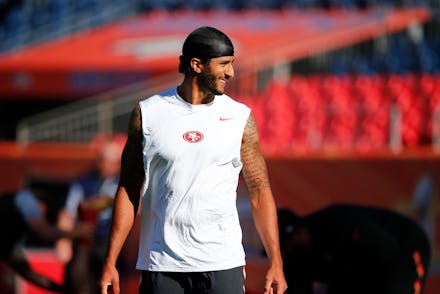Colin Kaepernick was criticized for not speaking publicly. Now he's facing backlash for it

Colin Kaepernick has a lot to say about racism in the United States.
The sixth-year quarterback for the San Francisco 49ers made national headlines after Friday's pre-season exhibition game against the Green Bay Packers for sitting down during the national anthem.
In the two times that he's addressed the media since his protest, he has very carefully and methodically explained his actions.
After Friday's game against the Packers, he told NFL.com's Steve Wyche exactly why he didn't stand for the national anthem.
"I am not going to stand up to show pride in a flag for a country that oppresses black people and people of color," Kaepernick said. "To me, this is bigger than football and it would be selfish on my part to look the other way. There are bodies in the street and people getting paid leave and getting away with murder."
And then on Sunday, after sports pundits and outraged fans had time to make their disagreements public, he reiterated his intentions. "To me, I feel like this is something that has to change," he said. "When I feel like there's significant change and that flag represents what it's supposed to represent and this country is representing people that way that it's supposed to, I'll stand."
Kaepernick also explained that his refusal to stand was not meant as a sign of disrespect to people who've served in this nation's armed forces, but rather a challenge to make sure that those sacrifices were not made in vein.
Kaepernick's protest has become the talk of sports media, even earning the bizarre endorsement of Republican presidential candidate Donald Trump.
But there is something deeply ironic about the criticism of Kaepernick. Not long ago, Kaepernick was known as the "man of few words," an enigmatic player who refused to speak at length to media.
In one memorable instance, frustrated reporters actually counted the number of words he used in a press conference: 87. That type of back-and-forth earned him a reputation for being standoffish and an embarrassment.
He was even mocked by fans for his responses to the media.
The San Francisco Chronicle's Al Saracevic even wondered aloud if Kaepernick had suddenly lost his voice and refused to say anything of substance publicly at al.
"Since taking over as the 49ers' starter last year, the 'Turlock Tornado' has been as tight-lipped as... well, as tight-lipped as Jim Harbaugh," Saracevic wrote. "Short, non-descript answers are the norm. And, it's a shame. The guy has a fabulous personality — one that he's chosen to shield from the world."
Sports analyst Colin Cowherd, who's long criticized Kaepernick for not speaking and looking like traditional (i.e. black) quarterbacks, even went so far as to say that Kaepernick "is not a grown up" for not speaking eloquently in news conferences. He went on, "I watch Colin Kaepernick... no self-awareness."
There's arguably few things more grown up than risking your livelihood for the belief that black people people of color should have the right to live safely in their communities.
Now, so-called fans are burning their Kaepernick jerseys because they don't like what he has to say about racism in the United States. They want him to shut up and play football.
We can't have it both ways. Either we want to hear what Kaepernick — a politically astute black man who happens to play football for a living — has to say, or we don't. For every person who's publicly criticized Kaepernick's recent protests, there have been plenty of who've embraced him because of it:
Athletes can be more than the public platforms upon which they stand. They have power to bring attention to the struggle for justice like few others in our culture. If nothing else, Kaepernick is showing the world just how powerful his voice is — and there are plenty of people who are eager to listen.